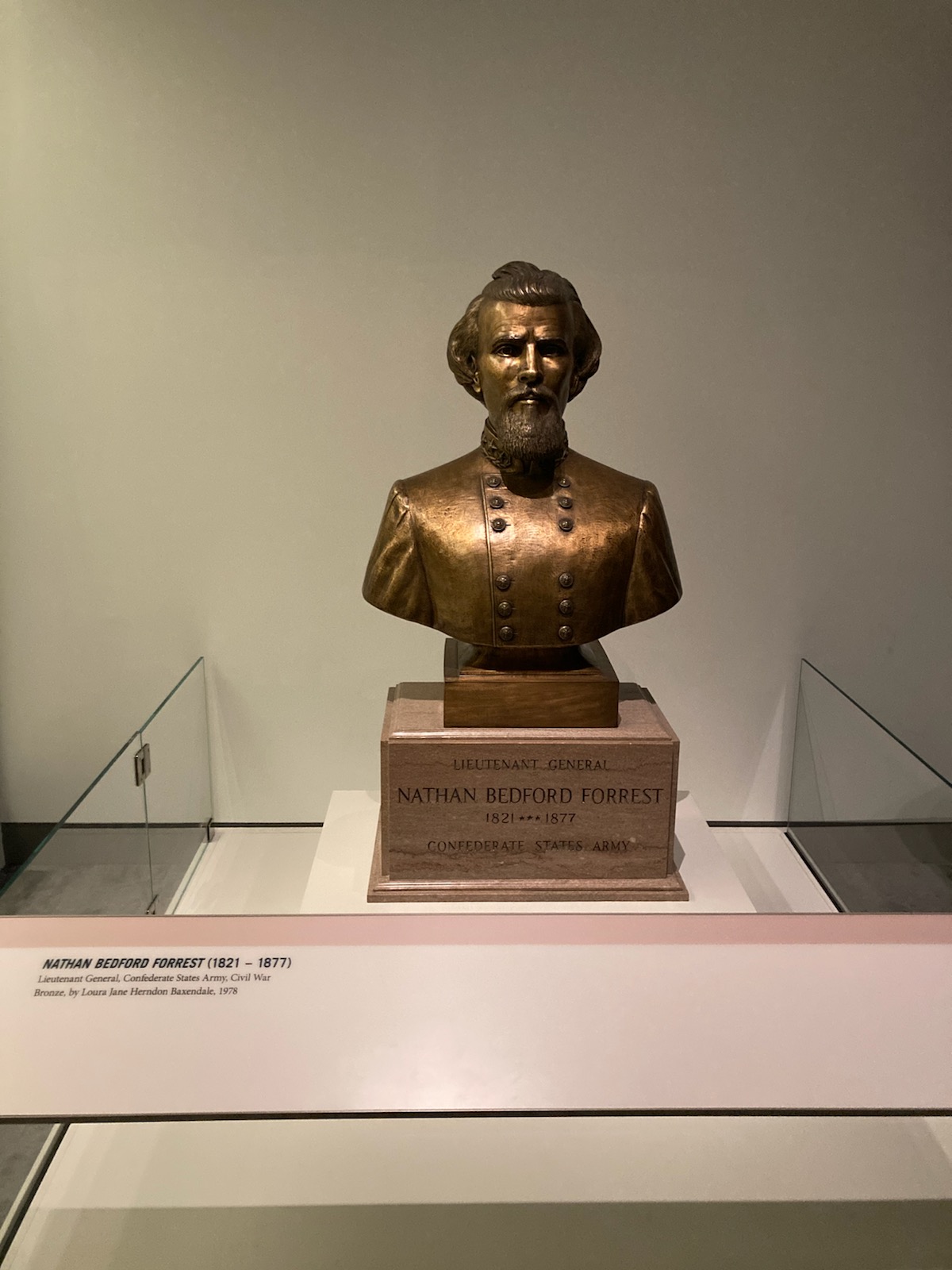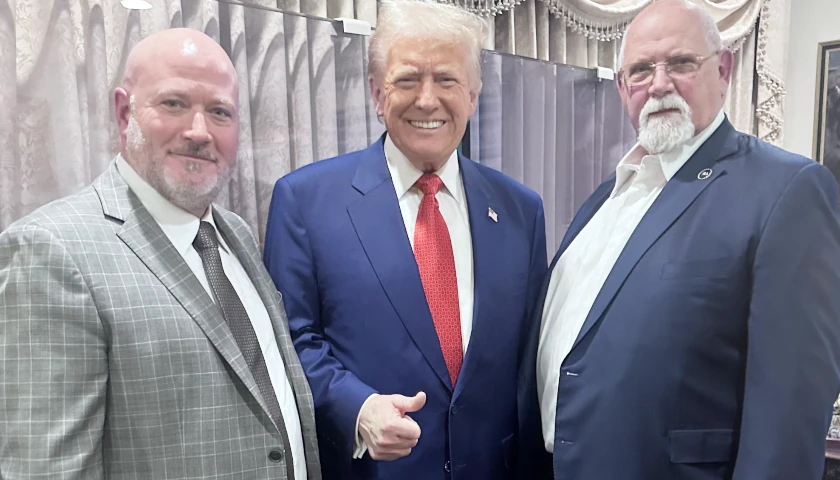Three bills filed in the General Assembly seek to preserve, protect and properly display historic relics, artifacts and memorials primarily related to the Confederate States of America and Tennessee’s involvement during the War Between the States.
All three bills are sponsored in the state Senate by State Senator Janice Bowling (R-Tullahoma) and in the state House by State Representative Terri Lynn Weaver (R-Lancaster) on behalf of the Sons of Confederate Veterans’ organization.
The Sons of Confederate Veterans (SCV), the direct heir of the United Confederate Veterans’ non-profit, organized at Richmond, Virginia in 1896, is the oldest hereditary organization for male descendants of Confederate soldiers. The SCV continues to serve as a historical, patriotic, and non-political organization dedicated to ensuring that a true history of the period between 1861 and 1865 is preserved, the legislation states.

The bust of Lieutenant General Nathan Bedford Forrest at the Tennessee State Museum, where it sits at the end of a corridor by itself, despite Governor BIll Lee’s statement the day before the State Capitol Commission’s vote to relocate the bust from the Capitol, “At a minimum, there should be context around Forrest to acknowledge the complexity of his legacy in Tennessee. I believe his contribution to what life in the 19th century looked like in Tennessee is important and it deserves to be displayed, written about and discussed in the most appropriate location which is the Tennessee State Museum.”
Thirty-year Tennessee member of the SCV, Mike Dunn, told The Tennessee Star that his experience since joining has been “a wonderful educational, non-political, nonprofit historical preservation organization.” It’s an experience that compelled Dunn to obtain a History and Political Science degree from Trevecca Nazarene College, now University.
The first bill, SB2473 and the companion HB2873, Dunn told The Star, is for all for the historical relics related to the Confederate States of America that are currently in the storage of the Tennessee State Museum (TSM) in Nashville to be permanently transferred to the museum at the Headquarters of the SCV in Elm Springs, Tennessee.
While the search function of the TSM website indicates there are hundreds of items related to the Confederate States of America, only a handful are on display and ever will be on display, Dunn says, “due to the continuous decay of American culture and lack of respect for historical tradition.”
In one specific example offered by Dunn, there are 83 Civil War era flags in TSM’s inventory, of which 80 are Confederate flags, only two of which are on display. Both of the display flags are the red-and-white-striped with a corner field of blue containing a star for each of the Southern states in the Confederacy of the First National Confederate flag. There are no Confederate Battle flags, with the famous St. Andrews Cross, at the new TSM as there were prior to the museum’s move.
Several years ago, Dunn explained, the SCV put in their Constitution that 20 percent of the revenues derived from the sale of SCV Tennessee license plates would go directly to the TSM for the preservation, care and display of the Confederate relics on display. Since 2004, according to Dunn, the SCV has donated $163,680.14 to the TSM for that purpose.
Individual members of the SCV have also raised funds to preserve artifacts of particular import to them, such as Ronnie Mangrum, who raised $50,000 to conserve and preserve the Flag of the 20th Tennessee, according to Dunn.
The cost of storage, maintenance, cleaning and display cases is being borne by the taxpayer, even though it is unlikely that they will ever be publicly displayed again.
Additionally, Dunn was told by Richard White, the Curator of 18th and 19th Century Tennessee History, that a new building is being constructed for the TSM to store historical items, including those from the Confederate States of America.
If passed, the law would require the TSM to turn over all historical relics currently under its care relating to the Confederate States of America to the SCV.
This would not only eliminate any state taxpayer funding being spent by the TSM to store the items, no such funding would be used for the physical transfer of the artifacts from the TSM to the SCV headquarters.
Similarly, a second bill, SB2470, and the companion, HB2874, would transfer the bust of Lieutenant General Nathan Bedford Forrest from the TSM to the SCV.
The bust was commissioned in 1977 upon the passage of legislation by the Tennessee General Assembly, paid for and donated by the Joseph E. Johnston Camp #28 of the SCV, of which Democrat state Senator Douglas Henry was a member and the sponsor of the legislation. The bust was placed in the Tennessee Capitol Building, where it remained until Friday, July 23, 2021, when it moved to the TSM.
INSERT BUST IMAGE AND CAPTION HERE
Like the artifacts from the same era, state funds would no longer be required for the display, storage or maintenance of Forrest’s bust, or for the transfer to the SCV headquarters.
The bust would join the remains of Forrest and his wife Mary Ann Montgomery Forrest at the Historic Elm Springs in Columbia, where they were interred at a period-appropriate ceremony, The Star reported, after being removed from Memphis, Tennessee.
The third bill, SB2697 and the companion HB2872, is an amendment to the Tennessee Heritage Protection Act and mirrors a new Alabama law, according to Dunn. The bill’s genesis, Dunn says, is the summer of 2020, when violence and destruction were allowed by many cities and counties. By removing law enforcement, elected officials not only failed their constituents, but caused widespread chaos and destruction.
The legislation puts the burden on the elected official, as it prohibits a state or local government or other political subdivision in the state in control of public property from:
– renaming a memorial or public building named after a historic figure, entity or event;
– relocating, removing, altering, obscuring from view, renaming, dishonoring, disparaging or reinterpreting with competing signage, wording, symbols, objects or other types or means of communication a memorial; or
– disturbing a memorial located on public property or knowingly allowing an individual or entity to do so.
No jail time and its associated costs are associated with the bill. Rather, there would be a financial penalty to the governmental entity for the commission of any of the prohibited acts in the amount of $10,000 for each day that a violation continues.
The fines, collected by the state’s attorney general, would be deposited by the state treasurer into the Tennessee historic preservation fund established in the legislation to be used for the preservation, repair, refurbishment and conservation of memorials.
All three bills were filed for introduction by their respective sponsors on February 2. The legislation transferring the custody and care of the Nathan Bedford Forrest bust from the Tennessee State Museum to the Sons of Confederate Veterans is the only one currently scheduled to be heard by the House Public Service Subcommittee on March 2 and the Senate State and Local Government Committee on March 8.
– – –
Laura Baigert is a senior reporter at The Star News Network, where she covers stories for The Tennessee Star and The Georgia Star News.
Photo “Terri Lynn Weaver” by Tennessee General Assembly. Photo “Janice Bowling” by Tennessee General Assembly. Background Photo “Tennessee State Museum” by Tennessee State Museum.

Sign up here to get your copy of The Star News Network Daily Update
Daily updates, breaking news, special offers, and more







